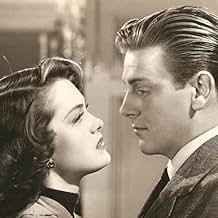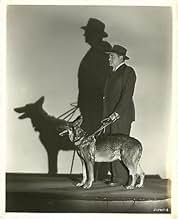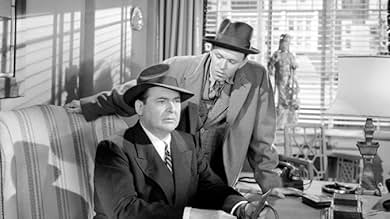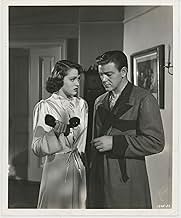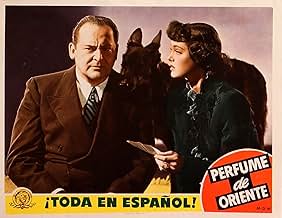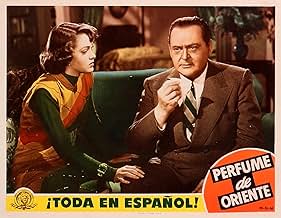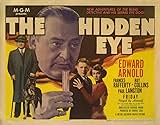Ajouter une intrigue dans votre langueBlind detective Duncan Maclain relies on his working senses to piece together an assortment of clues to solve a case of murder.Blind detective Duncan Maclain relies on his working senses to piece together an assortment of clues to solve a case of murder.Blind detective Duncan Maclain relies on his working senses to piece together an assortment of clues to solve a case of murder.
- Réalisation
- Scénario
- Casting principal
Thomas E. Jackson
- Insp. Delaney
- (as Thomas Jackson)
Raymond Largay
- Arthur Hampton
- (as Ray Largay)
Avis à la une
After several members of Jean Hampton's family are murdered, the police begin to suspect her fiancé. Jean decides to hire a private detective to help find the real killer. Captain Duncan Maclain comes onto the case. Being blind, Maclain is a rather unique detective who brings his own methods and skills to the case. And, as one of the few clues is a distinct perfume left behind at each crime scene, being blind may prove an advantage. But can he uncover the killer before anyone else is murdered?
Unlike a lot of the older films I've watched lately, I'm not really a fan of The Hidden Eye. My first issue with the film is the way Edward Albert played Maclain. It just never feels right. I didn't care for him as a character. His deep, hearty laughing response to most every situation really put me off. He solves a case - laughter. He uncovers a clue - laughter. He wrestles a baddie - laughter. His dog is kidnapped - laughter. It was so bizarre and I didn't care for it. My second issue was how easily the mystery was solved. One of the biggest clues is a phone number that Maclain overhears being dialed. How fortunate that of all the phone numbers the bad guy could have called, he dials one that Maclain already knows. So by happenstance, Maclain comes up with the murderer's identity. This also didn't work for me.
The real highlight and the thing I will remember most about watching The Hidden Eye was seeing Audrey Totter in an all too brief, uncredited performance as a perfume saleslady. Her 45 seconds of screen time was so amazing that I had to stop the movie to look her up on IMDb.
4/10
Unlike a lot of the older films I've watched lately, I'm not really a fan of The Hidden Eye. My first issue with the film is the way Edward Albert played Maclain. It just never feels right. I didn't care for him as a character. His deep, hearty laughing response to most every situation really put me off. He solves a case - laughter. He uncovers a clue - laughter. He wrestles a baddie - laughter. His dog is kidnapped - laughter. It was so bizarre and I didn't care for it. My second issue was how easily the mystery was solved. One of the biggest clues is a phone number that Maclain overhears being dialed. How fortunate that of all the phone numbers the bad guy could have called, he dials one that Maclain already knows. So by happenstance, Maclain comes up with the murderer's identity. This also didn't work for me.
The real highlight and the thing I will remember most about watching The Hidden Eye was seeing Audrey Totter in an all too brief, uncredited performance as a perfume saleslady. Her 45 seconds of screen time was so amazing that I had to stop the movie to look her up on IMDb.
4/10
Capt. Maclain, the blind detective, is called in on a murder case by a young lady of his acquaintance, Frances Rafferty. She is about to be married to Barry Gifford; they've tried twice before, but her father wants them to wait. They hope that three times will be lucky. Father seems to be agreeable over the telephone, and he sets up a seven pm appointment for the two to come and talk it over. But when Barry gets there just a few seconds early, he finds his prospective father in law dead at his desk. He's been murdered and the suspicion of the police has fallen on young Barry. For the sake of young love, we hope that Maclain can prove the police wrong before the picture ends, but it looks very bad for Barry.
This is not an exceptional film, but it's better than average for a forties B and the acting holds up very well. The plot is a good one, although the number of good suspects is quite small and the film doesn't cheat. But I think that even if you do figure out who the murderer is early on, the situations and the well acted characters will keep you entertained.
This is not an exceptional film, but it's better than average for a forties B and the acting holds up very well. The plot is a good one, although the number of good suspects is quite small and the film doesn't cheat. But I think that even if you do figure out who the murderer is early on, the situations and the well acted characters will keep you entertained.
Edward Arnold was an excellent actor, and all films with him are outstanding for his contribution. He made two films as the blind detective Maclaine with his good dog Friday, and although rather short, they are both excellent, the second even better than the first. There is nothing cheap or artificial in the construction of the intrigue, which eventually keeps constantly increasing in excitement and suspense, and you have to worry at times about the detective, especially when his dog gets into trouble. Ray Collins is abominable as the corrupt godfather-like guardian, and it is impossible not to fall into the trap of suspecting the wrong person of all these family murders. This is great entertainment for a chamber drama of murder at home.
Blind detective Duncan Maclain is asked for help by a young woman whose fiancé is the prime suspect in a murder. This is the second Duncan Maclain movie starring Edward Arnold. The first, Eyes In the Night, was released in 1942. I'm not sure about the reason for the gap between the movies. If MGM was trying to launch a series of B detective movies around this character, one would assume they would have produced them quickly. Maybe this was filmed years before it was released. I don't see that info here on IMDb but that makes more sense than them waiting three years to make a follow-up to a B programmer that wasn't a huge hit to begin with. There's something very odd about the opening minutes of this one. The audio appears to be dubbed. The actors' lips are in sync with the words but it still seems off. You'll see what I mean.
Edward Arnold is always worth a look. Reliable Ray Collins leads a so-so cast backing up Arnold. The weakest part is Frances Rafferty, whose overwrought performance borders on hysterics half the time. It's amusing at first but quickly annoying. She's very pretty, though. Audrey Totter has one small scene but it's a great one. Not a bad B detective movie. The pace is good and there's a nice amount of humor sprinkled throughout. The mystery itself isn't much of a mystery as the killer is revealed to be the most obvious suspect about halfway into the movie. I really wanted it to be the fiancé because his scenes with Rafferty were insufferably corny. If you're a fan of these kinds of movies I'm sure you'll enjoy this enough. Definitely not a waste of an hour so give it a shot.
Edward Arnold is always worth a look. Reliable Ray Collins leads a so-so cast backing up Arnold. The weakest part is Frances Rafferty, whose overwrought performance borders on hysterics half the time. It's amusing at first but quickly annoying. She's very pretty, though. Audrey Totter has one small scene but it's a great one. Not a bad B detective movie. The pace is good and there's a nice amount of humor sprinkled throughout. The mystery itself isn't much of a mystery as the killer is revealed to be the most obvious suspect about halfway into the movie. I really wanted it to be the fiancé because his scenes with Rafferty were insufferably corny. If you're a fan of these kinds of movies I'm sure you'll enjoy this enough. Definitely not a waste of an hour so give it a shot.
Courtsey of MGM's prolific/proficient second feature output unit, comes this sequel to Fred Zinnemann's debut feature 'Eyes In The Night', about a visually-impaired sleuth. This time around, the technical team is unfortunately less resourceful than their protagonist who is busy, with the aid of his faithful guide dog, trying to clear an innocent man of murder.
The replacement of B-frisson chills with chuckles is a miscalculation on this outing, and stereotype B-movie characterisations abound from vulnerable love interest to seedy villains. The story's gritty, 'urban' settings, replete with dark alleyways and disused warehouses, are never exploited to the full effect of their classic noir trappings.
The proceedings are all lighthearted enough if a little too genial. However, although there is some inevitable sentiment, the film is surprisingly unpatronising in its treatment of our blind hero. All in all it's a disappointing sequel, but not an hour-and-a-bit wasted.
The replacement of B-frisson chills with chuckles is a miscalculation on this outing, and stereotype B-movie characterisations abound from vulnerable love interest to seedy villains. The story's gritty, 'urban' settings, replete with dark alleyways and disused warehouses, are never exploited to the full effect of their classic noir trappings.
The proceedings are all lighthearted enough if a little too genial. However, although there is some inevitable sentiment, the film is surprisingly unpatronising in its treatment of our blind hero. All in all it's a disappointing sequel, but not an hour-and-a-bit wasted.
Le saviez-vous
- AnecdotesThe little black terrier who distracts seeing eye dog Friday in the scene where a truck nearly runs over Edward Arnold is one of the most famous canines in cinema history. Six years earlier, he had portrayed Toto in The Wizard of Oz.
- GaffesWhen Barry goes to turn on the lights in Uncle Rodney's office (about five minutes into the film), there is a slight delay between when he flips the switch by the door and when the lights come on in the room.
- ConnexionsFollows Les yeux dans les ténèbres (1942)
Meilleurs choix
Connectez-vous pour évaluer et suivre la liste de favoris afin de recevoir des recommandations personnalisées
Détails
- Durée1 heure 9 minutes
- Couleur
- Rapport de forme
- 1.37 : 1
Contribuer à cette page
Suggérer une modification ou ajouter du contenu manquant

Lacune principale
By what name was L'oeil caché (1945) officially released in India in English?
Répondre

